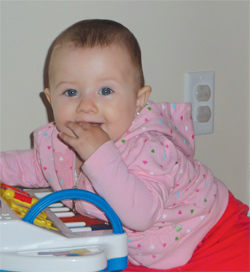Preventing burns

![]() Ensure all outlets are secured with a snug-fitting outlet cover. That way, your baby will be safe from electrical shock.
Ensure all outlets are secured with a snug-fitting outlet cover. That way, your baby will be safe from electrical shock.
Photo: Rémy Brunelle
Electrical outlets and wires
To keep your baby from being burned or getting an electrical shock, make sure his environment is safe. Ensure all outlets are secured with a snug-fitting outlet cover, and never leave appliance or extension cords hanging. (see Babyproofing - Electrical cords and outlets).
Fire
It is essential that you install a smoke detector on every floor and replace the battery periodically, for example when you change your clocks in the fall and spring.
Keep matches, lighters, and candles out of the reach of children.
Hot liquids
Children have thinner skin than adults, so they can be burned more easily by a hot liquid. Some accidents can easily be avoided. For example, don’t eat soup or hot beverages when you are holding your baby or leave a hot liquid unattended. Also beware of steam and hot electrical appliances.
Hot water
![]() Never leave your child in a bathtub or sink without adult supervision.
Never leave your child in a bathtub or sink without adult supervision.
Québec’s Building Code requires that home water heater thermostats be set so that the water in the tank is no cooler than 60°C (140°F). This reduces the risk of water contamination by bacteria. At that temperature, however, water can cause second- and even third-degree burns in children within a second.
Burns caused by hot tap water occur most often at bath time. To prevent the risk of burns, always check the water temperature with your elbow or wrist before putting your child in the tub. Water should be warm, i.e., body temperature.
You should ideally have a device installed on the faucet you use to bathe your child (e.g., bathtub or sink faucet) to keep the water temperature at or below 49°C (120°F). This device can be installed on the pipe or near the faucet. You can also purchase faucets with this device built in.
Some children are capable of turning on the hot water tap and burning themselves. Never leave your child in a bathtub or sink without adult supervision.


